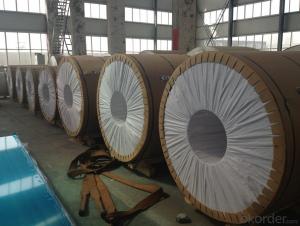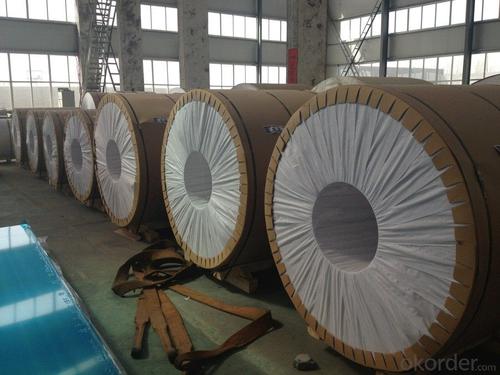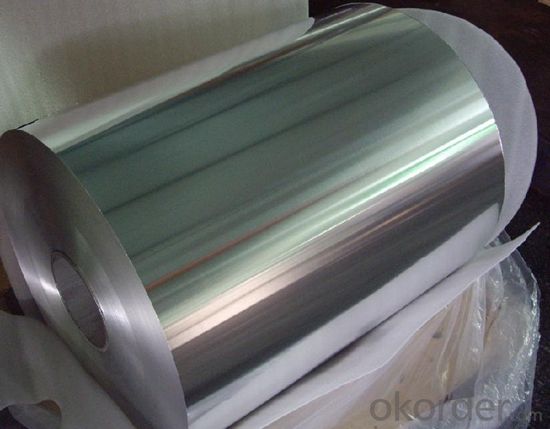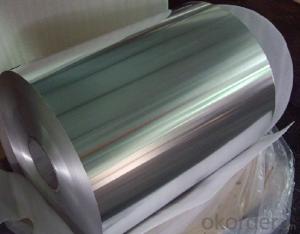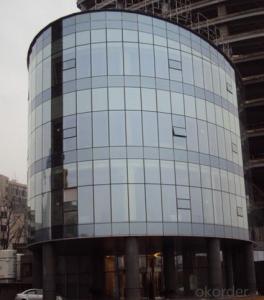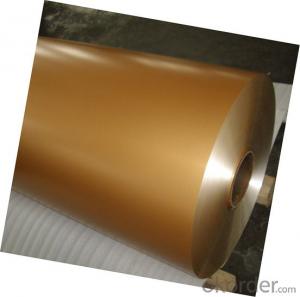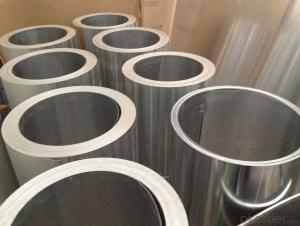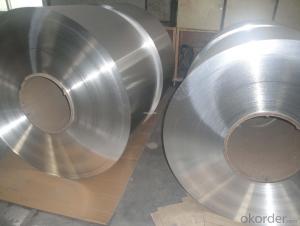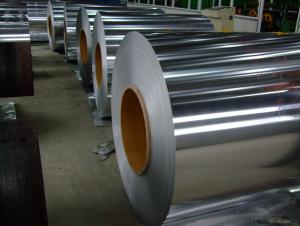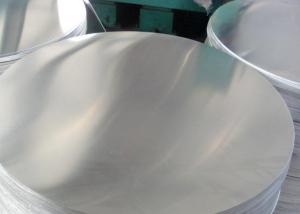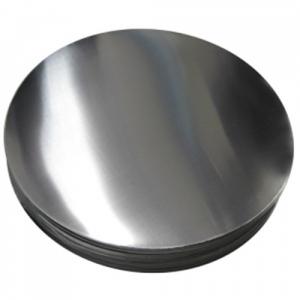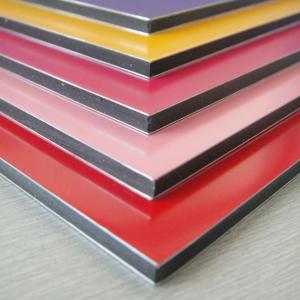Aluminum Cold Rolled Coil for Gutter Made in China
- Loading Port:
- Shanghai
- Payment Terms:
- TT OR LC
- Min Order Qty:
- 5 m.t.
- Supply Capability:
- 100000 m.t./month
OKorder Service Pledge
OKorder Financial Service
You Might Also Like
Specification
Product Description
Alloy: 5052(AlMg2.5)
Temper: O,H12,H22,H32,H14,H24,H34,H16,H26,H36,H18,H38,F
CHEMICAL COMPOSITION LIMITS (%)
Silicon | Iron | Copper | Manganese | Magnesium | Chromium | Nickel | Zinc | Titanium | Others | Total | Aluminum |
0.25 | 0.4 | 0.10 | 0.10 | 2.2-2.8 | 0.15-0.35 | 0.10 | 0.05 | 0.15 |
Remainder |
Main application: Magnesium gives this alloy its enhanced corrosion resistance, workability, strength and weldability. Typical uses include aircraft fuel tanks, container body, truck/trailer body, electronic mounting plates and panels, fan blades, refrigeration liners, storm shutters and utensils.
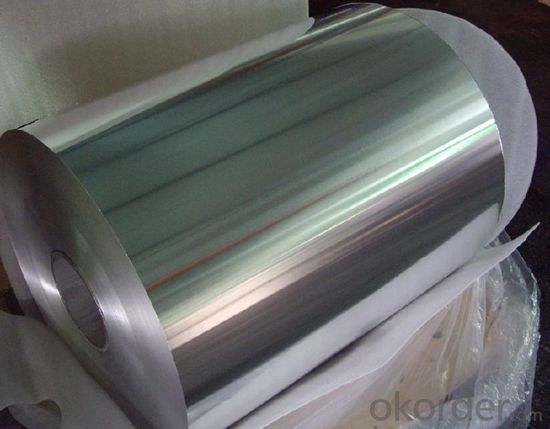
Mechanical Property Limits
Alloy | Temper | Thickness(mm) | Tensile Strength(MPa) | Elg%(50mm) |
5052 | O | >0.5-0.8 >0.8-1.3 >1.3-6.5 >6.5-10.0 | 170-215
| ≥15 ≥17 ≥19 ≥18 |
H12/H22/H32 | >0.5-1.3 >1.3-4.5 | 215-265 | ≥5 ≥7 | |
H14/H24/H34 | >0.5-0.8 >0.8-1.3 >1.3-4.5 | 235-285 | ≥3 ≥4 ≥6 | |
H16/H26/H36 | >0.5-0.8 >0.8-4.5 | 255-305 | ≥3 ≥4 | |
H18/H38 | >0.5-0.8 >0.8-4.5 | ≥270 | ≥3 ≥4 | |
H112 | >4.5-6.5 | ≥195 | ≥9 ≥7 | |
>6.5-12.5 | ≥195 | |||
>12.5-40.0 | ≥175 | |||
>40.0-80.0 | ≥175 |
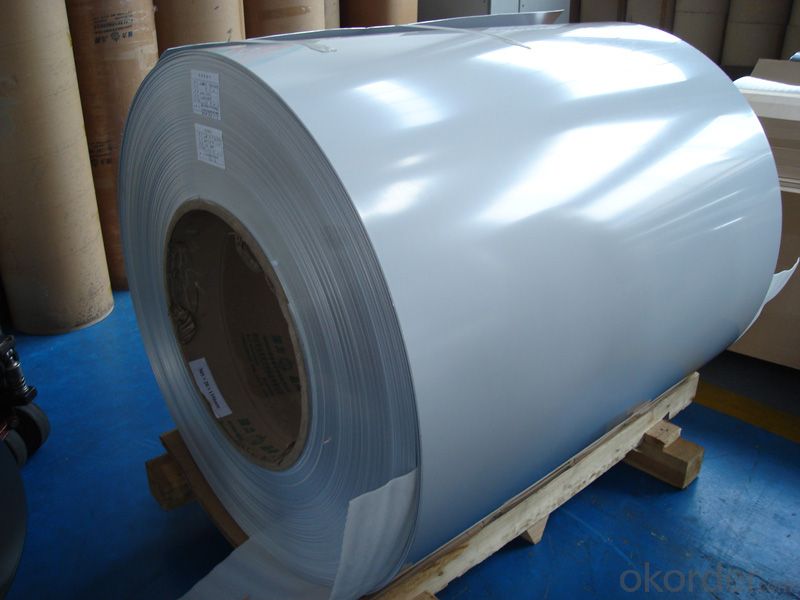
Our Services
Payment: by 30%T/T in advance and balance before shipment or 100% L/C at sight
Delivery: within 30 days after we get your deposit or L/C.
Packing: sea worthy wooden pallet
Loading port: Qingdao/Shanghai/Tianjin, China
Company Information
CNBM is in aluminum foil, coil, sheet, plate for more than 10 years, thus we have rich product, technology and market experiences. With the world’s top aluminum processing equipments, experienced technical staff, cooperative and professional sales team, and the enterprise concept of responsibility and sharing, we have been widely focused since the day set up, and has gained high praise from customers home and abroad until now.
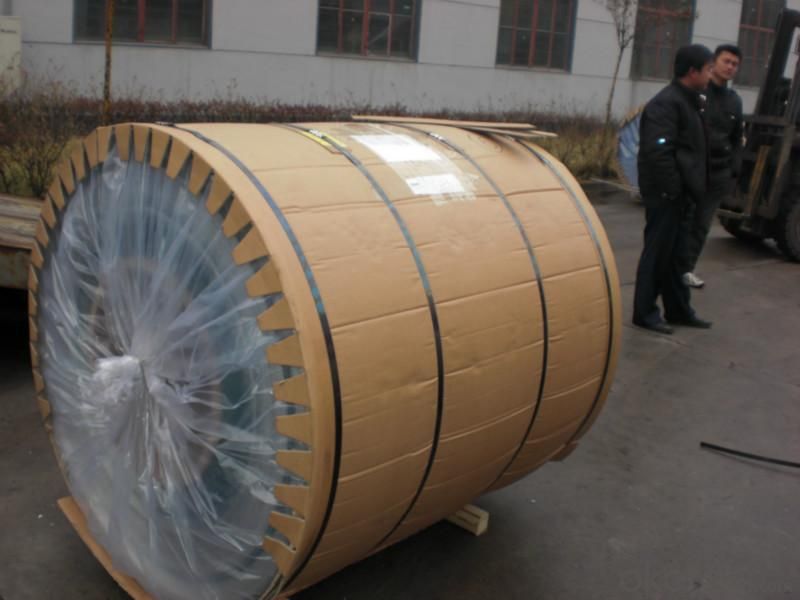
Our Services
CNBM is ready to assist with any product needs or enquiries. We value our customers and welcome your thoughts and feedback.
Please send comments, questions and requests through alibaba or our personal contact so they can be directed to the appropriate department.
About samples: Based on our company rules, a few samples are willing to be offered, but clients are requested to pay freight.
Working time:9:00~17:30(GM+8) from Monday to Friday, but you also can contact with us via personal contact information during our leisure time. We will try our best to offer you service in 24*7 hours.
Any quality, quantity problems are occured, response you will get in time not over more 24 hours after we recieve your complains. Problems will be solved in one week throught friendly negotiation.
- Q: This question asks about the typical issues that arise due to the corrosion of aluminum.
- <p>Common problems with aluminum corrosion include loss of structural integrity, which can compromise the safety and performance of aluminum components. Corrosion can lead to a decrease in mechanical strength, increased brittleness, and a reduction in the electrical and thermal conductivity of aluminum. Additionally, aesthetic issues such as discoloration and pitting can occur, affecting the appearance of aluminum surfaces. Environmental factors and improper handling can accelerate corrosion, leading to costly repairs or replacements.</p>
- Q: This question asks for methods to determine the presence of aluminum in an alloy.
- <p>To determine if an alloy contains aluminum, one can use various analytical techniques. A common method is spectroscopy, which can identify the presence of specific elements by analyzing the wavelengths of light absorbed or emitted. Another approach is the use of a spark test, where a sample is struck against a grinding wheel to produce sparks; the color and pattern of these sparks can indicate the presence of aluminum. Chemical tests, such as the reaction with sodium hydroxide, can also be used, as aluminum reacts with NaOH to produce hydrogen gas. Lastly, X-ray fluorescence (XRF) is a non-destructive technique that can accurately determine the elemental composition of an alloy, including aluminum content.</p>
- Q: How can we decrease our reliance on aluminum in everyday life?
- <p>Yes, there are several ways to reduce the use of aluminum in daily life. Opt for glass, ceramic, or stainless steel containers instead of aluminum ones. Choose wooden or bamboo utensils over aluminum ones. When possible, select products with minimal aluminum packaging. Avoid non-stick cookware, as it often contains aluminum. Use a cast iron or glass baking sheet instead of aluminum foil in the oven. Educate yourself on the presence of aluminum in everyday products and make conscious choices to reduce exposure.</p>
- Q: This question asks for examples of alloys that have a significant amount of aluminum and are known for their strength and ductility.
- <p>Alloys that are known for their high aluminum content and possess excellent strength and ductility include 6061 aluminum alloy, 7075 aluminum alloy, and 2024 aluminum alloy. 6061 is widely used in structural applications due to its balance of strength, corrosion resistance, and formability. 7075 is one of the strongest aluminum alloys and is used in aerospace and high-strength applications. 2024 is known for its good mechanical properties and is used in aircraft structures and other demanding applications. These alloys leverage the benefits of aluminum, such as low density and high resistance to corrosion, while their specific compositions and heat treatments enhance their strength and ductility.</p>
- Q: Is it possible to recycle aluminum cans to create new ones?
- <p>Yes, old aluminum cans can be recycled to make new ones. The recycling process for aluminum is highly efficient and environmentally friendly. Aluminum cans are collected, sorted, and then shredded into small pieces. These pieces are melted down in a furnace, and the molten aluminum is poured into molds to create new cans. This process uses only 5% of the energy required to produce aluminum from raw materials, making it a sustainable and cost-effective method of production.</p>
- Q: Is it possible to utilize aluminum in the construction of airplanes to enhance fuel efficiency?
- <p>Yes, using aluminum can make airplanes more fuel efficient. Aluminum is lightweight, which reduces the overall weight of the aircraft, leading to lower fuel consumption. Additionally, aluminum has good strength-to-weight ratio and is resistant to corrosion, making it a popular material in aircraft construction. However, it's important to note that the use of aluminum must be balanced with other materials to ensure structural integrity and safety.</p>
- Q: This question asks for a comparison of the benefits and drawbacks of using aluminum foil in the culinary process.
- <p>Aluminum foil offers several advantages in cooking, such as easy clean-up, even heat distribution, and the ability to create a seal for steaming or baking. It's also versatile, being suitable for both roasting and wrapping food for baking. However, there are disadvantages, including potential health concerns due to the leaching of aluminum into food, especially at high temperatures. Additionally, foil can tear easily, and it's not suitable for non-stick surfaces or use under broilers. Environmentally, it's not biodegradable and contributes to waste, which is a significant disadvantage.</p>
- Q: What benefits does aluminum offer compared to other metals?
- <p>Aluminum has several advantages over other metals, including its low density, which makes it lightweight and ideal for transportation applications. It also has excellent corrosion resistance due to the formation of a protective oxide layer. Aluminum is highly malleable and ductile, allowing it to be easily shaped and formed into various products. It is also a good conductor of heat and electricity, making it useful in electrical wiring and heat exchangers. Additionally, aluminum is abundant and relatively inexpensive compared to other metals, and it is recyclable, contributing to its sustainability.</p>
- Q: This question asks about the steps involved in preparing aluminum foil for use in food packaging.
- <p>Aluminum foil for food packaging is processed through several steps. First, aluminum ingots are melted and then rolled into thin sheets. The sheets are cleaned to remove any impurities and coated with a thin layer of food-grade protective coating to prevent any chemical reactions with the food. Next, the sheets are cut into rolls or sheets of standard sizes. The aluminum foil is then inspected for quality, ensuring it is free from defects and safe for food contact. Finally, it is packaged and shipped to manufacturers who use it to wrap or package food products.</p>
- Q: Is it possible to utilize aluminum in the construction of building materials?
- <p>Yes, aluminum can be used to make building materials. It is known for its lightweight, high strength, and resistance to corrosion, making it ideal for various construction applications. Aluminum is commonly used in window frames, roofing materials, facades, and structural components. Its durability and recyclability also contribute to its popularity in sustainable building practices.</p>
Send your message to us
Aluminum Cold Rolled Coil for Gutter Made in China
- Loading Port:
- Shanghai
- Payment Terms:
- TT OR LC
- Min Order Qty:
- 5 m.t.
- Supply Capability:
- 100000 m.t./month
OKorder Service Pledge
OKorder Financial Service
Similar products
Hot products
Hot Searches
Related keywords
